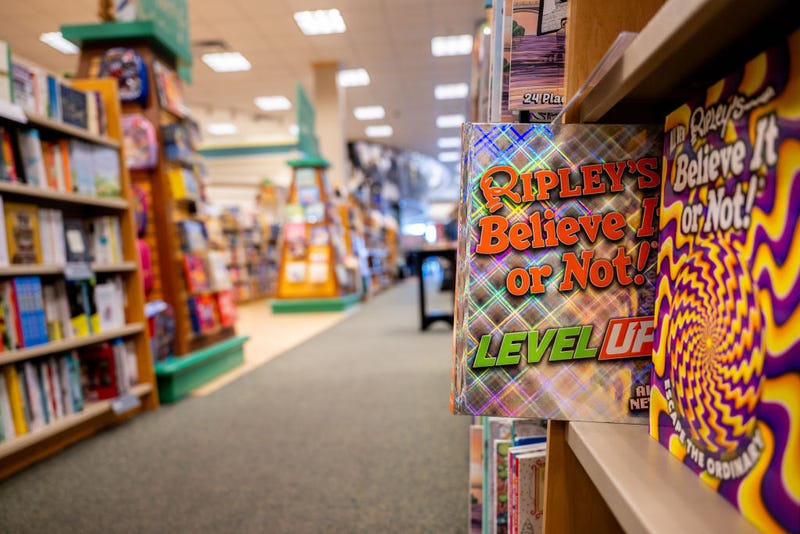
Efforts to ban library books in the U.S. continued last year – according to the American Library Association, the number of titles targeted for censorship shot up 65%.
With 4,240 unique book titles targeted for censorship, book censorship attempts have reached the highest level ever recorded by the ALA. At public libraries alone, there was a 92% increase in titles targeted for censorship.
Book ban efforts in the U.S. have been increasing in recent years, according to the PEN America advocacy group.
“Over the past two and a half years, PEN America has been at the forefront of tracking an evolving movement to exert ideological control over public education across the United States,” the group explained. “This campaign – which PEN America has dubbed the ‘Ed Scare’ – is penetrating public libraries, higher education institutions, and public schools, using state legislation and intimidation tactics to suppress teaching and learning about certain stories, identities, and histories.”
The New Republic dubbed efforts to ban books “the Right-Wing War on Books” last fall. Audacy has also reported on attempts to ban books from school libraries, including one effort that resulted in a mother being banned from her son’s school.
Last year, PEN America and publisher Penguin Random House, as well as authors, and parents of children affected by the book bans carried out by Florida’s Escambia County School District and School Board, filed a suit in federal court calling for books to be returned to school libraries.
“Children in a democracy must not be taught that books are dangerous. The freedom to read is guaranteed by the constitution,” said Suzanne Nossel, CEO of PEN America. “In Escambia County, state censors are spiriting books off shelves in a deliberate attempt to suppress diverse voices. In a nation built on free speech, this cannot stand. The law demands that the Escambia County School District put removed or restricted books back on library shelves where they belong.”
This January, Judge T. Kent Wetherell of the United States District Court for the Northern District of Florida heard oral arguments on the school district’s motion to dismiss. He denied the motion in an “unexpected order,” finding standing for all plaintiffs.
Last summer, Gov. J.B. Pritzker also made Illinois the first state in the nation to pass legislation meant to stop book bans at publicly funded libraries when he signed House Bill 2789 into law.
“Illinois’ young people shouldn’t be kept from learning about the realities of the world,” Pritzker said. “I want them to become critical thinkers, exposed to ideas that they disagree with, proud of what our nation has overcome and thoughtful about what comes next.”
In Florida, where Republican Gov. Ron DeSantis signed a bill that allowed certain books to be banned from school libraries, Democrats worked to use that very law to ban “The Courage To Be Free: Florida’s Blueprint for America's Revival”, DeSantis’ own memoir.
Another act of resistance to book bans came from Nashville, Tenn., where a Davidson County campaign called “Freedom to Read” featured library cards that said “I read banned books.”
According to the ALA’s Office for Intellectual Freedom, there were 1,247 demands to censor library books, materials, and resources in 2023 as these counter-efforts were underway. In addition to the 92% increase in titles targeted for censorship at public libraries, the percentage of titles grew by 11% at school libraries.
More than 100 titles were targeted for bans in the following 17 states: Colorado, Connecticut, Florida, Idaho, Illinois, Iowa, Kentucky, Maryland, Missouri, North Carolina, Ohio, Pennsylvania, Tennessee, Texas, Utah, Virginia, and Wisconsin. An ALA heat map displays bans by state.
“Groups and individuals demanding the censorship of multiple titles, often dozens or hundreds at a time, drove this surge,” said the ALA. It added that titles “representing the voices and lived experiences of LGBTQIA+ and BIPOC individuals made up 47% of those targeted in censorship attempts.”
To fight against book bans, the ALA launched Unite Against Book Bans, a national initiative intended to empower readers everywhere to fight against censorship. National Library Week, which is coming up next month, will mark the second anniversary of the initiative. During that week, the ALA will reveal its list of the top 10 most challenged books.
“The reports from librarians and educators in the field make it clear that the organized campaigns to ban books aren’t over, and that we must all stand together to preserve our right to choose what we read,” said Deborah Caldwell-Stone, director of ALA’s Office for Intellectual Freedom. “Each demand to ban a book is a demand to deny each person’s constitutionally protected right to choose and read books that raise important issues and lift up the voices of those who are often silenced. By joining initiatives like Unite Against Book Bans and other organizations that support libraries and schools, we can end this attack on essential community institutions and our civil liberties.”
